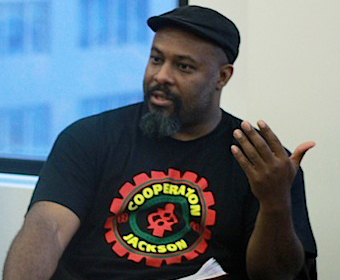[A recent (earlier this year) analysis and the related programmatic plans, in an interview of Kali Akuno by editors of New Politics magazine. It is an analysis well worth studying. — Frontlines ed.]
Riad Azar and Saulo Colón, New Politics, Summer 2015

Kali Akuno
Kali Akuno served as the coordinator of special projects and external funding for Jackson Mississippi’s late Mayor Chokwe Lumumba. He is co-founder and director of Cooperation Jackson as well as an organizer with the Malcolm X Grassroots Movement. He was interviewed by email by Riad Azar and Saulo Colón, both members of the New Politics editorial board.
New Politics: Kali, part of your work and that of the Malcolm X Grassroots Movement (MXGM) has been strategically and organizationally focused on the South. Can you explain the thinking behind this and also how it connects to your understanding of the specificity of the South (especially due to its changing demographics because of the recent migrations of Latino workers) in terms of capitalist power and racism?
Kali Akuno: First and foremost, it is critical to understand that the Malcolm X Grassroots Movement is a revolutionary nationalist organization that is part of the New Afrikan Independence Movement. Revolutionary nationalism is a left-wing variant of nationalism, practiced by colonized and oppressed peoples, that seeks to liberate them from the yoke of their colonizers and oppressors and replace the capitalist-imperialist social order imposed upon them with a socialist social system. The New Afrikan Independence Movement is a multi- tendency movement struggling to liberate the southeastern portion of the so-called mainland territories now colonized by the United States government. The New Afrikan Independence Movement recognizes that territories it is claiming for its national territory rightfully belong to the indigenous nations of Turtle Is- land, and makes no claims that supersede their just claims. However, our aim is to unite with indigenous peoples and with other oppressed peoples throughout the United States empire and break the back of white supremacy and the settler-colonial project through a unified anti- colonial, anti-imperialist, and anti-capitalist struggle. So, it is critical to understand MXGM, and its parent organization, the New Afrikan People’s Organization, and their commitment to the South in this context.
It is also critical to understand the economic and political role of the South within the colonial-imperial framework of the United States government. Since the defeat of the Confederacy, the South has largely operated as an internal colony from which cheap natural resources and labor could be readily drawn. This strategic site of super-exploitation provided critical capital accumulation and other developmental competitive advantages to the U.S. settler-colonial project in the late nineteenth and early twentieth centuries that played a critical role in the ascendency of U.S. imperialism on a global scale later in the twentieth century. And given the structural acknowledgement of colonialism and slavery within the U.S. political framework—specifically the creation of the electoral college, the unrepresentative Senate, and the limited number of congressional districts— the South has always played a disproportionate role in determining the overall politics of the empire. The South typically plays a decisive role in deciding the presidency and the makeup of the Congress, bending both toward right-wing settler-colonialism. This historic reality is what gives rise to the phrase, “as the South goes, so goes the nation.” Continue reading →










